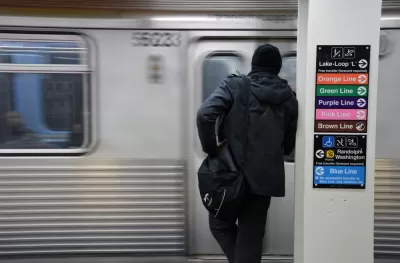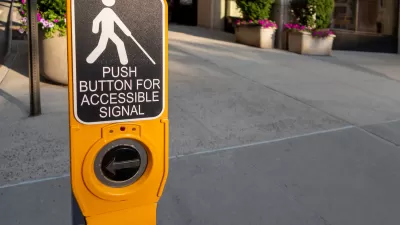The city received a federal grant geared toward improving accessibility at CTA and Metra stations, close to a third of which lack ADA compliance.

[Updated on December 20, 2022]
Chicago transit agencies will receive $185 million in federal funds targeted to accessibility improvements at Chicago Transit Authority (CTA) and Metra stations, according to an article by Alice Yin in the Chicago Tribune. Of its 145 stations, CTA has 42 non-ADA-compliant stops.
“The largest award for the city will be $118.5 million, for the CTA to modernize its Irving Park, Belmont and Pulaski stations to be fully compliant with the Americans with Disabilities Act.” The funding will also extend to the 59th/60th Metra Electric station and the 95th Street-Chicago State University station.
The federal program funding the project, called the All Stations Accessibility Program (ASAP), awarded 15 grants in nine states, all of which require the funding to support renovating inaccessible rail facilities built before 1990. “More than 900 such legacy stations remain inaccessible today, the federal government estimates.” In 2018, CTA pledged to make all of its stations accessible by 2038, a timeline unacceptable to disability advocates like Illinois Senator Tammy Duckworth, who herself uses a wheelchair. Prior to the passage of the infrastructure bill, which superseded her proposal, Duckworth introduced legislation to increase funding for accessibility.
Also attracting media attention for their accessibility grants are transit systems in Pittsburgh, New Jersey, and Cleveland. The ASAP was created by the Infrastructure Investment and Jobs Act.
FULL STORY: CTA, Metra to get $185 million in federal funding to make stations more accessible

Maui's Vacation Rental Debate Turns Ugly
Verbal attacks, misinformation campaigns and fistfights plague a high-stakes debate to convert thousands of vacation rentals into long-term housing.

Planetizen Federal Action Tracker
A weekly monitor of how Trump’s orders and actions are impacting planners and planning in America.

In Urban Planning, AI Prompting Could be the New Design Thinking
Creativity has long been key to great urban design. What if we see AI as our new creative partner?

King County Supportive Housing Program Offers Hope for Unhoused Residents
The county is taking a ‘Housing First’ approach that prioritizes getting people into housing, then offering wraparound supportive services.

Researchers Use AI to Get Clearer Picture of US Housing
Analysts are using artificial intelligence to supercharge their research by allowing them to comb through data faster. Though these AI tools can be error prone, they save time and housing researchers are optimistic about the future.

Making Shared Micromobility More Inclusive
Cities and shared mobility system operators can do more to include people with disabilities in planning and operations, per a new report.
Urban Design for Planners 1: Software Tools
This six-course series explores essential urban design concepts using open source software and equips planners with the tools they need to participate fully in the urban design process.
Planning for Universal Design
Learn the tools for implementing Universal Design in planning regulations.
planning NEXT
Appalachian Highlands Housing Partners
Gallatin County Department of Planning & Community Development
Mpact (founded as Rail~Volution)
City of Camden Redevelopment Agency
City of Astoria
City of Portland
City of Laramie





























